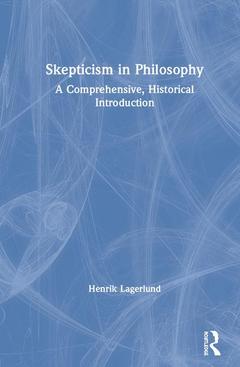Skepticism in Philosophy A Comprehensive, Historical Introduction
Auteur : Lagerlund Henrik

In this book, Henrik Lagerlund offers students, researchers, and advanced general readers the first complete history of what is perhaps the most famous of all philosophical problems: skepticism. As the first of its kind, the book traces the influence of philosophical skepticism from its roots in the Hellenistic schools of Pyrrhonism and the Middle Academy up to its impact inside and outside of philosophy today.
Along the way, the book covers skepticism during the Latin, Arabic, and Greek Middle Ages and during the Renaissance before moving on to cover Descartes? methodological skepticism and Pierre Bayle?s super-skepticism in the seventeenth century. In the eighteenth century, it deals with Humean skepticism and the anti-skepticism of Reid, Shepherd, and Kant, taking care to also include reflections on the connections between idealism and skepticism (including skepticism in German idealism after Kant). The book covers similar themes in a chapter on G.E. Moore and Ludwig Wittgenstein, and then ends its historical overview with a chapter on skepticism in contemporary philosophy. In the final chapter, Lagerlund captures some of skepticism?s impact outside of philosophy, highlighting its relation to issues like the replication crisis in science and knowledge resistance.
Introduction 1. Pyrrhonism and Sextus Empiricus 2. Academic Skepticism 3. Augustine and Early Medieval Skepticism 4. Al-Ghazali and Skepticism in Medieval Arabic and Greek Philosophy 5. God as a Deceiver: External World Skepticism in Later Medieval Times 6. Skepticism in the Sixteenth Century: Montaigne, Charron, and Sanches 7. Descartes’s Methodological Skepticism, Bayle’s Super-Skepticism, and Berkeley’s Anti-Skepticism 8. Hume’s Skepticism and Hume on Skepticism 9. The Anti-Skepticism of Thomas Reid, Lady Mary Shepherd, and Immanuel Kant as well as Skepticism in German Idealism 10. G.E. Moore and Ludwig Wittgenstein on Skepticism 11. Skepticism in Contemporary Philosophy 12. Non-Philosophical Skepticism
Henrik Lagerlund is Professor of the History of Philosophy at Stockholm University, Sweden. He works primarily on medieval and Renaissance philosophy, and has written several articles and books. He is also the editor of The Routledge Companion to Sixteenth Century Philosophy (2017) and The Encyclopedia of Medieval Philosophy, Second Edition (2020).
Date de parution : 05-2020
15.2x22.9 cm
Date de parution : 05-2020
15.2x22.9 cm
Thèmes de Skepticism in Philosophy :
Mots-clés :
Young Man; Hellenistic schools of Pyrrhonism; Book III; philosophy; Quod Nihil Scitur; Pierre Bayle's super-skepticism; Knowledge Acquisition; philosophical skepticism; Good Life; Human Made Climate Change; External World Skepticism; Academic Skepticism; Pyrrhonian Skepticism; Cicero’s Academica; Ancient Skepticism; Academic Skeptic; Dream Argument; Sextus Empiricus; Stoic Sage; Early Modern Philosophy; Infallible Belief; Diogenes Laertius; Science Skepticism; Skeptical Solution; Ibn Taymiyya; Replication Crisis; Byzantine Philosophy; Latin Medieval Philosophy; Raymond Sebond



